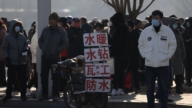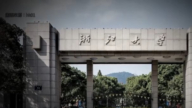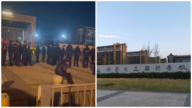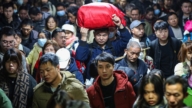【新唐人2014年09月18日讯】大陆富人近年来移民成风。一项最新的统计数据显示,目前有近半数的中国+富豪打算在未来的五年之内移居其他国家。如果再加上近三分之一已经移民海外的富豪,高达70%的大陆富人移民比例,已经称得上“世界之最”。有评论指出,安全感的缺失,使移民成了中国富人的“自卫手段”。
9月17号上午,因为要在美国上市,而被媒体炒得火热的阿里巴巴集团,忽然在官方微博发表声明说,该集团总裁马云的户口目前在杭州,未来也不会有任何移民计划。声明还表示,网上热传的“马云已经移民香港”的消息,存在“失实”。
这个声明是针对香港媒体《信报》前一天的一篇报导发出的。报导说,马云现身阿里巴巴在香港的路演时透露,已经通过投资移民落户香港,预计在明年底就会正式成为香港永久居民。报导还说,马云还透露已经在香港置业,并希望晚年在香港度过。
一则“爆料”,一份“辟谣”,截然不同的两种说法,引发了网民的关注和热议。有趣的是,大多数网民相信马云已经移民,理由是“如果能走,谁会不走? ”。也有的网民认为,阿里巴巴集团的声明是在放“烟雾弹”,因为声明自始至终没有出现“不移民香港”几个字。加上马云随后发文又声称“移民香港”应该说是“移居香港”,令网民更加笃定,马云是在玩文字游戏。
不管马云是否真的移民香港,但大陆富豪热衷移民却是不争的事实。据国际知名金融公司巴克莱(Barclays)最新发表的调查报告称,中国大陆有47%的富人正在考虑,在未来的五年内移民到发达国家。这个数字,远远高于受调查的其他国家29%的平均比例。
中国问题独立评论员李善鉴:“我个人的看法,比例它说50%,可能这还是十分保守的,如果在被调查的人的隐私被充分的保证的时候,我相信这个比例还会更高。”
另外,今年年初的“胡润研究院”调查报告显示,中国+富豪移民比例高达64%,其中有1/3身价超过亿元的富豪已经移民。
中国富人为什么热衷于移民呢?
中国金融智库研究员巩胜利:“第一个问题是政治环境发生了变化,一个是中国现在那些有钱人,很多是发的不义之财,这是一个的重要因素。第二个是中国的土地、空气、还有水土啊,这种大自然的环境也发生了变化,这种变化使人类的生存可能都比较麻烦。还有一个情况就是,中国现在这个所谓的法制建设,因为在一党之下,法制环境没有制衡,所以这个人文环境也发生了变化。”
而巴莱克的调查报告则显示,受访的大陆富人移民海外的最主要原因分别是:使子女获得更好的教育和就业机会,占78%;经济安全,占73%;理想气候环境,占73%;以及更好的医疗保障和福利,占18%。
虽然在各种因素中,“子女教育”占据比例最高,但有分析指出,除了让子女接受西方国家优质的教育之外,富豪们更多的是想借助子女给自己留后路。因为大部分评论观点都认为,大陆富豪移民的根本原因,是出于安全感的缺失。
李善鉴:“很多人其实他把孩子送出来,他也是觉得孩子将来在国外如果是能够立足,那对他来讲是一个后路。因为在中国,无论是多有权的人,还是多有钱的人,都会对自身的将来对自身的安危,充满了不确定性的担忧。”
中国问题独立评论员李善鉴指出,大陆独有的政治环境,决定了仅仅凭着遵守法纪的经商和投资,是无法成为亿万富翁的。往往派系斗争的失败,会使通过官商勾结和不正当手段得来的亿万家财付之一炬,有些被“惦记”上的富豪甚至会性命不保。这种情况,即使是重新建立法律体系,也是无济于事的。唯一“自保”的方法,只有逃离中国。
采访编辑/张天宇 后制/李智远
Jack Ma’s Immigration Hoax; The Exodus of China’s Rich
China has been seeing a trend of rich mainlanders
leaving the country in recent years.
Recent statistics show that nearly half of China richest
intend to relocate to other countries within the next five years.
Add to that the nearly 30 percent of Chinese tycoons who’ve
already emigrated, and you’ve got 70 percent
of China’s wealthy population going abroad, which can be said
to be the largest proportion of wealthy emigrants in the world.
Observers say that emigration has become the means of
self-defense for Chinese wealthy who feel unsafe in China.
On the morning of Sept. 17, Alibaba Group, which will soon
be listed in the U.S., has unexpectedly posted on its official
page on Weibo, China’s version of Twitter, saying that
the Group’s President Jack Ma has a permanent residence
registered in Hangzhou, and has no plans to emigrate.
The statement also said that popular online rumors
claiming that Ma had emigrated Hong Kong are false.
This statement a response to a previous report
by the Hong Kong Economic Journal.
The report said that Ma’s immigration to Hong Kong
via investment was revealed during a promotional event
for Alibaba in Hong Kong, and he will become a permanent
resident of Hong Kong at the end of next year.
The report also said Ma also revealed that he purchased
a house in Hong Kong and wants to live out his old age there.
The two opposing arguments, one claiming to “break news"
and one claiming to “refute rumors" have attracted much
attention and discussion among netizens.
Interestingly, the majority of netizens say that Ma has left,
reasoning that most who are able to emigrate from China do.
Some netizens say the statement by Alibaba Group is a smoke
screen, as it has no mention any immigration to Hong Kong.
Additionally, Ma subsequently stated he’d move
to Hong Kong instead of immigrating,
making netizens assured Ma is playing with words.
It’s an indisputable fact that wealthy mainlanders are keen to
emigrate, regardless of whether Ma immigrated to Hong Kong.
A survey report by the international finance corporation
Barclays says that 47 percent of rich mainland Chinese people
are considering emigrating to the developed countries
within the next five years.
This figure is much higher than the average ratio of 29 percent
from other surveyed countries.
Li Shanjian, independent China commentator: “My personal
opinion is that 50 percent is very conservative.
I believe the ratio would have been even higher if the privacy
of the respondents was fully guaranteed."
Additionally, the Hurun Research Institute’s survey this year
showed that the proportion of wealthy Chinese immigrants
is up to 64 percent, one third of whom are worth more than
1 billion yuan ($162.8 million) and have already immigrated.
Why are wealthy Chinese so keen on emigrating?
Gong Shengli, Chinese financial think-tank researcher:
“The first reason is the political environment has changed.
Many of today’s rich Chinese made their wealth
from ill-gotten gains, and this is an important aspect.
Second is the damage to the natural environment, including air,
land, and water, making human survival more troublesome.
Lastly, because of one-party rule,
there are no checks and balances in the legal environment,
and so the culture itself has also been changed,."
The investigative report from Barclays reveals that the main
reason Chinese responders say they want to emigrate is
to have their children get a better education and employment
opportunities, accounting for 78 percent of responses;
economic security and an ideal climate each accounted for
73 percent; and better health care and benefits accounted
for 18 percent of responses.
Although for a variety of factors, concern for children’s
education took the highest proportion, analysts say that
in addition to good education in Western countries,
the rich want to take advantage of the children
to leave themselves a way out.
Most observers say that the main reason for wealthy mainland
Chinese immigrants is their feeling a lack of security.
Li Shanjian: “Many people actually got themselves
a way to escape by sending their children out.
Because in China, no matter how much wealth or power one
has, one is full of uncertainty for one’s own future and safety."
Li says the mainland’s unique political environment decides
that people can’t become a billionaire by merely complying
with the law of business and investment regulations.
Often factional struggle will destroy the massive wealth
received through collusion or unfair means.
Some billionaires can’t even ensure their own safety.
In that case, even the re-established legal system is useless.
The only means of self-protection is to flee China.
Interview & Edit/Zhang Tianyu Post-Production/Li Zhiyuan




























